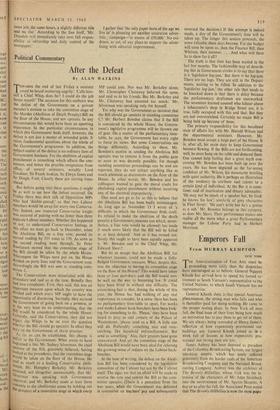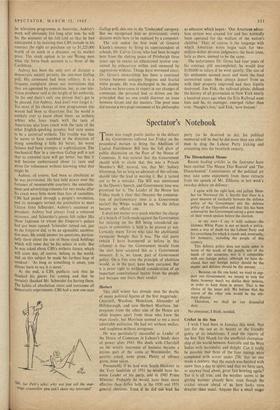Emperors Fall
From MURRAY KEMPTON
NEW YORK
Tin Americanisation of East Asia must be proceeding more tidily than the dispatches have encouraged us to believe. General Nguyen Khanh has arrived here to spend his forced re- tirement as South Vietnam's representative to the United Nations, to which South Vietnam has no representative.
General Khanh. then, is that special American phenomenon, the strong man who falls and who is thereafter paid for doing nothing. He came to the proper resting place. In New York all men fail, the final issue of their lives being how much an institution has to pay them to get rid of them. We are always being reminded of Henry James's reflection of how expensively provisional our buildings are; General Khanh joined us in a week full of lessons in how expensively pro- visional our strong men are too.
James Aubrey has been deposed as president of the Columbia Broadcasting System, our largest television empire, which has lately suffered grievously from the border raids of the American Broadcasting Company and the National Broad- casting Company. Aubrey was the architect of The Beverly Hillbillies, whose trick was the in- trusion of the characters of Mr. John Steinbeck into the environment of Mr. Spyros Skouras. A day or so after his fall, the Associated Press noted that The Beverly Hillbillies is now the most popu-
lar television programme in Australia; Aubrey's work will obviously live long after him. So will he; the accounts of his fall told us that he had anticipated it by insisting that CBS include in his contract the right to purchase up to $1,225,000 worth of its stock at a discount on its market price. The stock option is to our gtrong men What the Swiss bank account is tu those of the Caribbean.
Aubrey has been the only sort of dictator a democratic society permits, the one-man Gallup poll. His command had been solitary. It is a frequent complaint about our institutions that they are operated by committee, but, as one tele- vision producer said at the height of his authority, 'In the end there's only one person that's got to be pleased. Jim Aubrey. And don't ever forget it.' Yet most of his choices of new programmes this season had been so disastrous that the world is unlikely ever to know about them; an aesthetic arbiter who loses touch with the taste of Americans also loses touch with the taste of the other English-speaking peoples; bad taste seems to be a universal resthetic. The trouble was that he seems to have stumbled in the direction of doing something a little bit better; his worst failures had been attempts at sophistication. The mechanical flaw in a one-man Gallup poll is not that its essential taste will get better, but that it Will become embarrassed about its taste and strive for refinement without knowing what that might be.
Aubrey, of course, had been as absolutist as he was provisional. He had held power over the fortunes of innumerable courtiers; the entertain- ment and advertising columns for two weeks after his crash were little more than lists of casualties. CBS had passed through a people's revolution, and its managers invited the journalists to meet Citizen John Schneider, Aubrey's successor as President. Aubrey had always lived a removed existence, and Schneider's guests felt rather like. those Japanese to whom the Emperor's palace. had just been opened. Schneider turned out, just as the Emperor did, to be an agreeable; unobtru- sive man. He could answer no questions, particu- larly those about the size of those stock holdings Which will some day be his solace in exile. But he was asked about CBS's esthetic future, which Will some day, of course, belong to the world, and on this subject he made his farthest leap of Candour: 'As long as something is unset, you almost have to say it is unset.'
At the end, a CBS publicist said that he thanked his guests for coming and that he Certainly thanked Mr. Schneider for having them. The habits of absolutism 'resist and overcome all democratic experiments. CBS had a new one-man
.0h. for Pete's Sake; why not just tell the mar-
Gallup poll, this one in the 'Undecided' category. But we recognised him as provisional; every dictator waits here to be replaced by a computer.
The city ended the first week of General Khanh's tenancy by firing its superintendent of schools, Dr. Calvin Gross, who had been brought here from the shining peace of Pittsburgh three years ago to rescue an educational system con- sumed by exhaustion within and menaced by aggressions without. Things have worsened since; Dr. Gross's stewardship has been a continual torture between unhappy Negroes and fearful white people. He was discharged in the shabby fashion we have come to expect in our changes of command; the personal had so driven out the principled that no one could discover an issue between Gross and his masters. The poor man did muster a two-page statement of his philosophy as educator which began: 'Our American educa- tion system was created for and has normally been operated for the welfare of the nation's children.' That, of course, is the language with which American wives begin suits for two- million-dollar divorce judgments; the basic issue, here as there, seemed to be the same.
The unfortunate Dr. Gross had four years of his contract still uncompleted; he would lose $150,000 in salary if he went quietly. The size of his settlement seemed more and more the final unresolved issue. Men always depart from us with their property improved and their dignity destroyed. Jim Fisk, the railroad pirate, defined the history of all provincials in New York nearly a hundred years ago when the Erie Railroad went but and he, its manager, emerged richer than ever. 'Naught's lost,' said Fisk, 'save honour.'



































 Previous page
Previous page